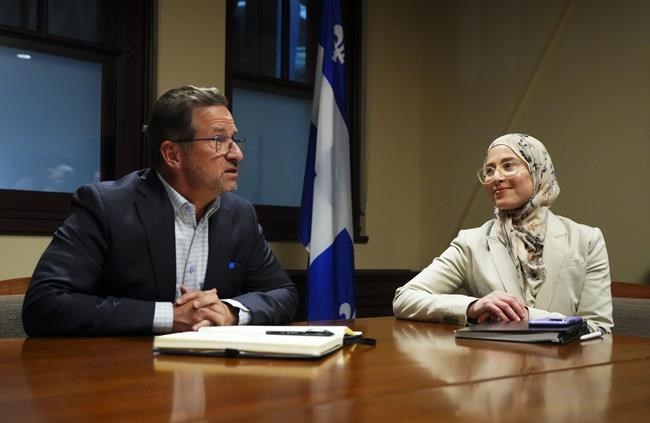OTTAWA — Canada's new special representative on combating Islamophobia has apologized for words that hurt Quebecers after leaders in that province called for her resignation.
Amira Elghawaby apologized in English before a meeting on Wednesday with Bloc Québécois Leader Yves-François Blanchet.
"As a member of Canada's Muslim community, we know what it's like to be stereotyped. We know what it's like for people to have biases, and I understand the words and the way that I have said them have hurt people in Quebec," Elghawaby said.
"I have been listening very carefully. I have heard you, and I know what you are feeling. And I am sorry."
Following the meeting, Elghawaby said that their conversation was constructive, but they "agree to disagree" when it comes to Quebec's Bill 21.
The law has been heavily criticized — including by Prime Minister Justin Trudeau — for discriminating against members of religious minorities by banning them from wearing religious symbols at their public-service workplaces.
"Our (Muslim) communities have expressed the ways that it is impacting them, and that is going to remain my message: this is a discriminatory bill," Elghawaby told reporters.
"That being said, the way that we're going to move forward on these types of different conversations is by being able to listen, and ensuring the ways we talk about these issues aren't hurtful on either side."
She said that moving forward, the dialogue needs to be free from "conflict journalism" and "conflict politics," because those who are caught in the middle are everyday people.
Multiple politicians in Quebec have called for Elghawaby's appointment to be rescinded because of comments she made in a 2019 opinion piece.
The column, co-written with former Canadian Jewish Congress CEO Bernie Farber, cited polling data to say that "a majority of Quebecers" who supported Bill 21 also held anti-Muslim views.
Farber and Elghawaby, a journalist and human-rights activist, were board members with the Canadian Anti-Hate Network at the time.
Trudeau said after the apology on Wednesday that it demonstrated the extent to which she is a sensitive person who is open to others' concerns and wants to "build bridges" in a difficult file.
Quebec Secularism Minister Jean-François Roberge said he appreciates Elghawaby's apology but it does not change his government's view.
"I still don't believe she has the credibility, the legitimacy to occupy the role the prime minister has given her," he told reporters in French. "I think that now, the second thing for her to do is to submit her resignation."
Earlier Wednesday, Trudeau said Quebec has a complicated history with religion, citing the oppression of the Catholic Church in the province before the Quiet Revolution largely removed the church from government services including health care and education.
He said it is important to him that all Canadians understand that before the Quiet Revolution, Quebecers "suffered the yoke and the attacks on individual rights and freedoms of an oppressive church."
"And that comes with it a certain perspective around what secularism is, and the role of religion in society that informs what modern Quebec is," he said. "Quebecers are not racists."
There are also Canadians, including in the Muslim community, for whom religion is extremely important in both a public and a private way, he said.
"What we need now is people who can understand and bridge those two realities," said Trudeau.
Elghawaby, he said, is the right person to try and bridge that divide.
"What started with a level of concern about some unfortunate statements is starting to look like a pile on, and we're very aware of where that's coming from," Crown-Indigenous Relations Minister Marc Miller, who represents a Quebec riding, said Wednesday prior to Elghawaby's apology.
"We have to be careful as a nation, as people instrumentalize the fear of the other, particularly those who have not been represented in the public space, like Muslims."
NDP Leader Jagmeet Singh said he wants the focus to turn towards combating Islamophobia and the violence that it leads to.
"Islamophobia is not a problem of any one place. It's a problem for the entire country," Singh said Wednesday. "We need to take this issue very seriously, and protect the members of our Muslim communities."
On Sunday, Canada marked the sixth anniversary of the Quebec City mosque shooting, when six men were killed not long after their evening prayers.
In 2021, a man drove his pickup truck into a Muslim family in London, Ont., killing a family of four and injuring one other.
"We have had other attacks in other parts of the country. We know Islamophobia kills. This is the issue," Elghawaby said.
This report by The Canadian Press was first published Feb. 1, 2023.
— With files from Mia Rabson.
Mickey Djuric, The Canadian Press



